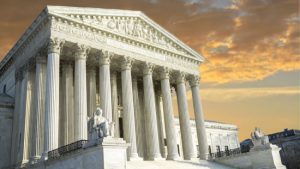Supreme Court FOIA Decision and Official Candor
 In Justice Amy Coney Barrett’s first majority opinion issued earlier this month, the U.S. Supreme Court ruled that the Freedom of Information Act (FOIA) does not require release of agency draft biological opinions under the “deliberative process” exemption in the law. The decision makes government less transparent by shielding scientific conclusions from disclosure unless they are finally adopted by agency decision-makers.
In Justice Amy Coney Barrett’s first majority opinion issued earlier this month, the U.S. Supreme Court ruled that the Freedom of Information Act (FOIA) does not require release of agency draft biological opinions under the “deliberative process” exemption in the law. The decision makes government less transparent by shielding scientific conclusions from disclosure unless they are finally adopted by agency decision-makers.
However, the ruling may have limited effect and may spur statutory reforms. In addition, its implementation will test President Biden’s rhetorical commitment to openness and scientific integrity.
The case, U.S. Fish & Wildlife Service v Sierra Club, concerned an attempt to force FWS and NOAA to release 2013 draft biological opinions which concluded that a proposed EPA rule governing cooling water intake structures was so weak that it would likely to jeopardize wildlife protected under the Endangered Species Act. As a result of those drafts, EPA issued a beefed-up rule in 2014 which all three agencies then agreed would not cause jeopardy and issued final biological opinions to that effect.
In her opinion, Justice Barrett held that such draft opinions could be withheld under FOIA because they were pre-decisional and covered by the deliberative process exemption (Exemption 5). Her conclusion, however, was based on three questionable rationales:
- She argued that agencies should not be “forced to operate in a fishbowl,” citing a 1973 case involving EPA. Yet, EPA’s very first Administrator, William Ruckelshaus, famously promised that the agency “would operate in a fishbowl” as a prerequisite for ensuring the quality and integrity of its work.
- She contended that nondisclosure would “encourage candor, which improves agency decision-making” by blunting “the chilling effect that accompanies the prospect of disclosure.” Yet, this ruling masked the true dynamics behind the ultimate cooling tower rule which was birthed in closed door meetings. Whether this lack of candor actually improved agency decision-making is both completely unverifiable and highly improbable.
- Despite her ruling, the draft opinions would not be secret because they must, as a matter of regulation be shared with the developer-applicant, as Justice Breyer points out in his dissent, the developer has both a vested interest and likely the political means to chill any agency draft conclusions. So, under Barrett’s holding, the developer can see the drafts while the public may not.
While this ruling addressed only draft biological opinions, in a footnote Justice Barrett maintained “the logic applied to these drafts also applies to the other draft documents.” As a result, agencies will now be much better able to hide inconvenient facts by keeping them in never-finalized drafts.
Yet, the impact of this case remains to be seen. The FOIA exemption does not forbid disclosure but leaves it to agency discretion. As Justice Barrett observed, “This case concerns the deliberative process privilege, which is a form of executive privilege.” Thus, it is up to the Biden administration whether to withhold or to release similar documents in response to future requests.
Nonetheless, it is unlikely that reliance upon an Executive Branch policy of self-disclosure will make much difference. President Obama and his Attorney General both issued FOIA directives promoting transparency. Notably, the dispute sparking this Supreme Court case arose under Obama.
Instead, this case invites Congressional correction. Congress could tighten Exemption 5 in a number of ways, such as requiring disclosure of all inter-agency communications. If Congress does take on FOIA reform, it should also address the related issue of agencies increasingly censoring the administrative record, a practice that expanded under Trump. The reason for this censorship is that agencies can better defend their questionable actions rooted in “alternative facts” from court challenge if all discordant information is excised before it can be examined.
A key lesson from the Trump experience is that neither the quality of decision-making, nor public confidence in the quality of that decision-making, is enhanced by secrecy and information suppression. PEER believes that both will be improved only if public scrutiny is not confined to an unobstructed view of the official talking points.
 Jeff Ruch is the Director of PEER’s Pacific office, having formerly served 22 years as the Executive Director of PEER.
Jeff Ruch is the Director of PEER’s Pacific office, having formerly served 22 years as the Executive Director of PEER.